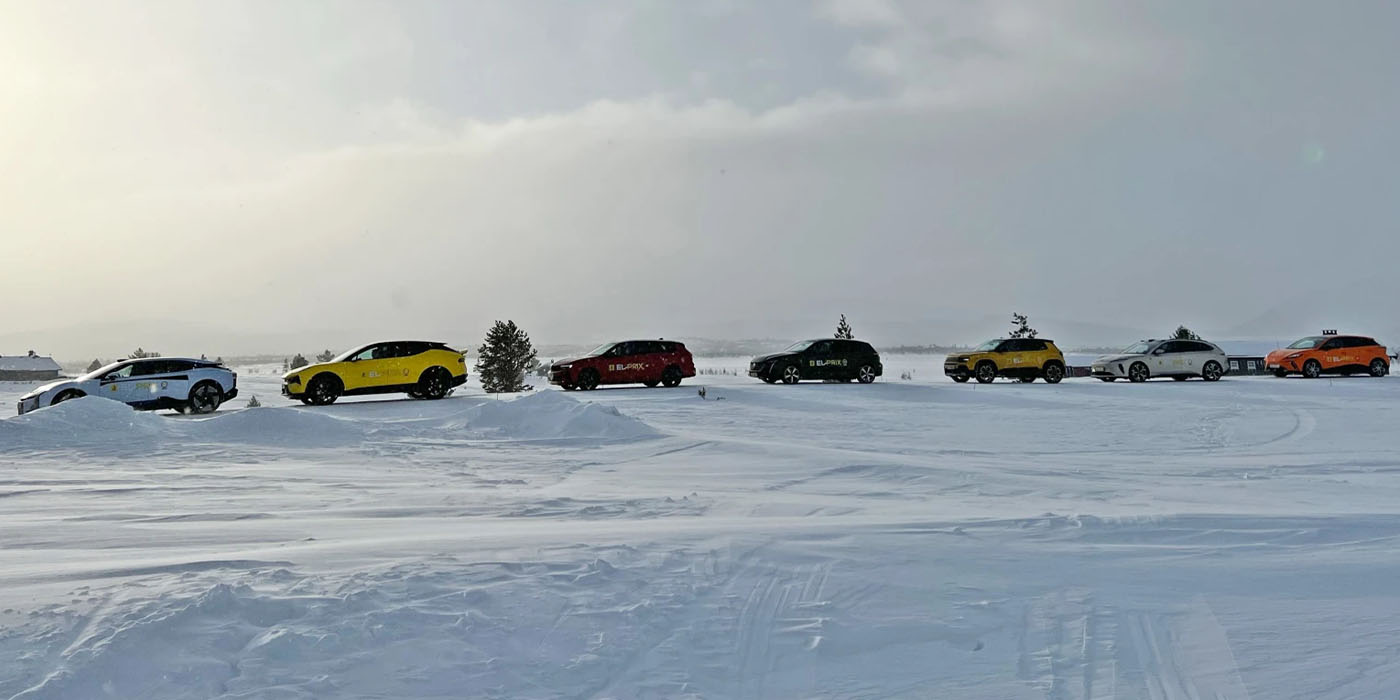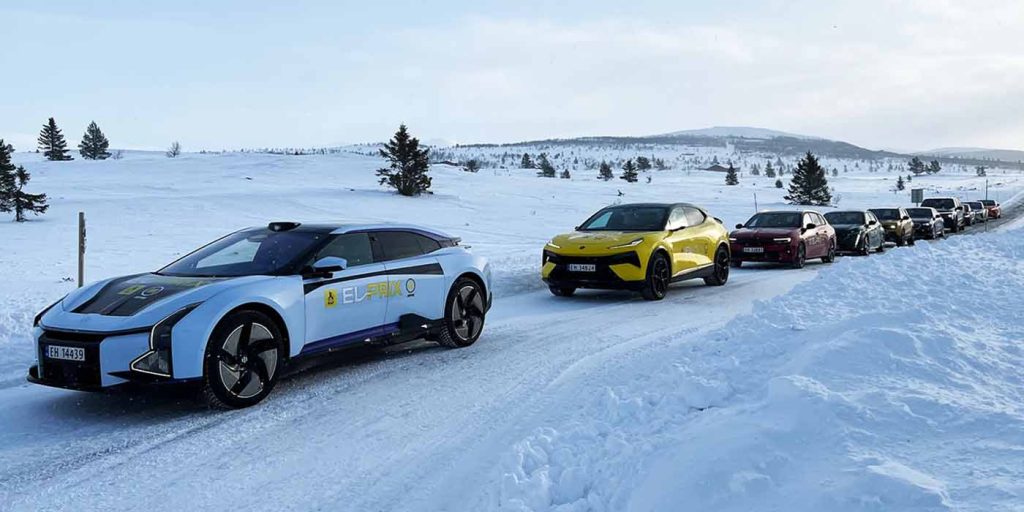
On Wednesday, the Norwegian Automobile Federation (NAF) completed its bi-annual El Prix event that tests the range of dozens of popular EVs from around the globe and various price brackets. While Tesla has dominated the last four years, 2024’s winter edition of the El Prix saw a newcomer not only deliver the most range in cold weather but also come closest to its advertised range.
The Norwegian Automobile Federation, or NAF, is the largest interest and consumer organization in the Nordic, with over 500,000 members – equivalent to roughly 25% of all vehicle owners in the country.
Twice a year alongside Motor, the NAF organizes a range test called the El Prix, described as the “world’s largest” – once in the winter and then again in the summer. Since 2020, Tesla EVs have dominated the bi-annual range tests, and this year’s winter El Prix saw the Model 3 as the clear favorite as it offered the most range on paper.
However, the 2024 lineup of 23 different EVs from around the world saw a newcomer steal the spotlight, with a range significantly less affected by the cold conditions compared to the other EVs.

HiPhi Z usurps Model 3 favorite in EV range test by 81 km
For the 2024 Winter El Prix, the NAF and Motor gathered a pool of 23 different EVs to track their range across Norway in temperatures between -2° and -10℃ (14° to 28℉) in addition to windy conditions.
In the morning, the EVs are fully charged and travel together on the same day, on the same route, under the same conditions for fairness. They are gathered up as they inevitably become depleted of range. Here’s the complete list of the contenders in this year’s winter EV range test, along with their results:
| Make/Model | Advertised Range (WLTP) | Consumption / 100 km | El Prix Winter Range | El Prix Winter Consumption / 100 km |
| Audi Q8 e-tron Sportback | 515 km (310 miles) | 22.4 kWh | 411.4 km (-20.1%) | 24.8 kWh (+10.4%) |
| BMW i5 (eDrive40) | 505 km (314 miles) | 18.7 kWh | 443.6 km (-12.2%) | 19.7 kWh (+5.3%) |
| BYD Dolphin | 427 km (265 miles) | 15.9 kWh | 339.2 km (-20.6%) | 171. kWh (+7.5%) |
| Ford F-150 Lightning | 429 kim (267 miles) | 18.7 kWh | 337.5 km (-21.3%) | 23.9 kWh (+27.8%) |
| HiPhi Z | 555 km (345 miles) | 20.4 kWh | 522 km (-5.9%) | 24.32 kWh (+9.2%) |
| Hyundai IONIQ 6 | 614 km (382 miles) | 14.3 kWh | 467.8 km (-23.8%) | 16.3 kWh (+14%) |
| Hyundai Kona Electric | 454 km (282 miles) | 16.6 kWh | 341.3 km (-24.8%) | 18.3 kWh (+10.2%) |
| Jeep Avenger | 395 km (245 miles) | 15.7 kWh | 286 km (-27.6%) | 19.4 kWh (+23.6%) |
| Kia EV9 | 505 km (314 miles) | 22.8 kWh | 441.9 km (-12.5%) | 23 kWh (+0.9%) |
| Lotus Eletre | 530 km (329 miles) | 20.3 kWh | 464.6 km (-12.3%) | 24.8 kWh (+22.2%) |
| Mercedes-Benz EQE SUV | 491 km ( miles) | 21.5 kWh | 399 km (-18.7%) | 22.5 kWh (+4.7%) |
| MG4 Trophy Long Range | 520 km ( miles) | 16.5 kWh | 399.6 km (-23.2%) | 17.5 kWh (+6.1%) |
| NIO EL6 (ES6) | 529 km (305 miles) | 22.1 kWh | 456 km (-13.8%) | 19.8 kWh (-10.4%) |
| NIO ET5 | 560 km (348 miles) | 21.6 kWh | 481.4 km (-14%) | 19.4 kWh (-10.2%) |
| Nissan Ariya | 498 km (309 miles) | 20.4 kWh | 369.4 km (-25.8%) | 21.7 kWh (+6.4%) |
| Opel Astra | 413 km (257 miles) | 15.7 kWh | 296 km (-28.3%) | 17.4 kWh (+10.8%) |
| Peugeot E-308 | 409 km (254 miles) | 12.7 kWh | 297 km (-27.4%) | 17 kWh (+33.9%) |
| Polestar 2 Long Range | 614 km (382 miles) | 15.8 kWh | 430 km (-30%) | 18.5 kWh (+17.1%) |
| Tesla Model 3 | 629 km (397 miles) | N/A | 441 km (-29.9%) | 18 kWh |
| Toyota bZ4X | 460 km (286 miles) | 16.2 kWh | 313.5 km (-31.8%) | 19.8 kWh (+22.2%) |
| Volkswagen ID.7 | 608 km (378 miles) | 14.4 kWh | 414 km (-31.9%) | 18.9 kWh (+31.2%) |
| XPeng G9 | 520 km (323 miles) | 21.3 kWh | 451.8 km (-13.1%) | 22.8 kWh (+7%) |
| Volvo C40 | 572 km (355 miles) | 17.5 kWh | 395 km (-30.9%) | 21.1 kWh (+20.6%) |
While other EVs led the pack in WLTP range and consumption on paper, the HiPhi Z out of China shined during the 2024 winter range test in total distance traveled on a single charge and had the lowest range loss compared to what its makers advertised.
Perhaps you haven’t heard of HiPhi yet, but maybe you need to check in with Electrek more because we’ve covered the young Chinese automaker several times in the past year, including the launch of the Z GT that dominated in Norway this week.
Top comment by Henry Curry
One metric missing is the battery capacity as tested. HiPhi Z has listed on its specs a 120kWh battery, which is quite large (and heavy). What are the other vehicles' capacities? Range is tightly coupled to battery size as well as efficiency, otherwise this is just blowing smoke.
Despite having a 74 km less advertised range than the favored Tesla Model 3, The HiPhi Z bested the world’s best-selling electric sedan by a whopping 81 km (50.3 miles) in real-world winter testing.
Despite harsh winter conditions, a massive inhibitor to EV adoption in today’s market, the HiPhi Z came closest to achieving its advertised EV range during the test, missing the mark by a mere 6%. The next closest was the relatively new BMW i5, which finished 12.2% less than its advertised range.
The Model 3 missed its target by nearly 30%. The Lotus Eletre came in a close third behind the i5, closing out the podium for premium EVs alongside the HiPhi Z.
There is a lot of additional insight into the data from the NAF’s 2024 EV winter range test you can view here. We look forward to the organization’s summer version of the El Prix to see how all these EVs (and likely some newcomers) fare under warmer conditions. Stay tuned.
FTC: We use income earning auto affiliate links. More.




Comments